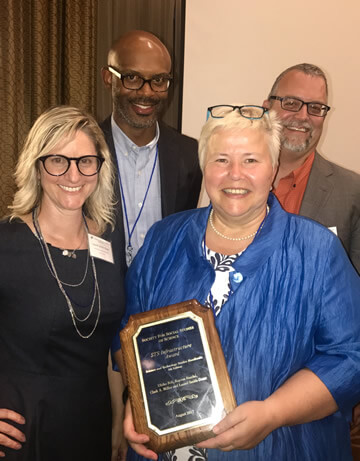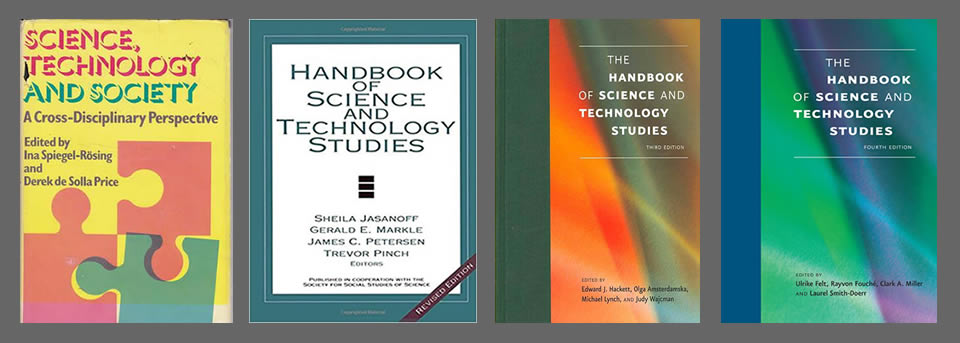
STS Infrastructure Award 2017: Editors of the Handbooks of Science and Technology Studies
The STS Infrastructure Award Committee is pleased to recognize the editors of the Handbooks of Science and Technology Studies with the 2017 Infrastructure Award. Each Handbook (1977, 1995, 2008, 2017) is the culmination of many years of careful planning and work by the editors – drafting a call, soliciting and selecting contributions, providing feedback, and co-ordinating a complex network of authors, texts, reviewers, publishers, guidelines, advisory committee members, and 4S Presidents and Council members. This is an excellent example of infrastructural work.
Each Handbook reflects the concerns, methods and insights of the time of its own production. But each volume builds on what has gone before, and the volumes speak to each other in fascinating ways. Reading the chapters, and examining the contributors, their affiliations, chapter titles, indices and bibliographies of each individual Handbook reveals the emergence and history of STS. This series of four Handbooks brings together an array of research syntheses, and at the same time maps the intellectual and institutional geography of our field, as well as its implications for neighbouring fields.

Handbook Editors
1st edition (1977, Sage) – edited by Ina Spiegel-Rösing and Derek de Solla Price
2nd edition (1995, Sage) – edited by Sheila Jasanoff, Gerald E. Markle, James C. Petersen, and Trevor Pinch
3rd edition (2008, The MIT Press) – edited by Edward J. Hackett, Olga Amsterdamska, Michael Lynch, and Judy Wajcman
4th edition (2017, The MIT Press) – edited by Ulrike Felt, Rayvon Fouché, Clark A. Miller, and Laurel Smith-Doerr (pictured above)
2017 Infrastructure Committee Members:
Geof Bowker, University of California, Irvine (chair); Kenji Ito, Graduate University for Advanced Studies, Sokendai, Japan; Gwen Ottinger, Drexel University, USA (4S Council member); Jane Summerton, VTI, Sweden; and Sally Wyatt, Maastricht University, The Netherlands.
Acceptance
We are delighted that the Society for Social Studies of Science has chosen the editors of the STS Handbooks to receive the 2017 Infrastructure Award. We humbly accept the honor on behalf of the authors, reviewers, advisers, and editors whose work has made the Handbooks part of our field’s foundation. We also pause to remember editors no longer among us: Ina Spiegel-Rösing and Derek J. de Solla Price, who together edited the first Handbook, and Olga Amsterdamska, who edited the third Handbook with Judy, Mike, and Ed. Olga was an extraordinary editor: perceptive and exacting, yet thoughtful, kind, and generous with her ideas.
Four Handbooks have been published to date—1977, 1995, 2008, and 2017—and each represents the ideas, commitments, and plans of our community at a particular moment. The first Handbook drew together disciplinary studies of science and technology, with a focus on policy, while later volumes represent an academic community in formation, mapping its terrain, consolidating its intellectual achievements, and inviting others to join the community or draw on its insights and achievements. In each instance the editors’ role was to elicit and blend relevant voices, seeking harmony and counterpoint, all the while maintaining tempo and rhythm for hundreds of pages and shelf-lives of several years. Too often editing is counted among academe’s most thankless tasks, and in the current context of academic evaluation the work involved in authoring and reviewing book chapters is similarly undervalued. But by honoring those associated with the Handbooks, the Society takes a welcome stand against this unfortunate practice. And by recognizing infrastructure as the active, vital, essential stuff that guides and supports all aspects of academic life, the Society is enacting its own ideas and ideals. We are grateful that our work with the Handbooks has been recognized in this way, and now we’ll rest on our laurels, eagerly awaiting the launch of many future volumes to supplement our own.
Edward J. Hackett on behalf of the editors of STS Handbooks, 1977-2017
2025: Digital STS
2024: Engaging Science, Technology, and Society (ESTS)
2023: Administrative and Editorial Pillars
2022: Administrative and Editorial Pillars of the Society and Field
2020: Catalyst: Feminism, Theory, Technoscience
2018: East Asian Science, Technology and Society: an International Journal (EASTS)
2017: Editors of the Handbooks of Science and Technology Studies
2016: WTMC (Netherlands Graduate Research School of Science, Technology and Modern Culture)

